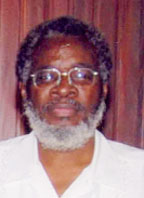PNC accuses gov’t of bad faith
The government yesterday defended its negotiating position with the UK for security sector reform saying that the British wanted to be the chief cook and bottle washer.

Cabinet Secretary Dr Roger Luncheon yesterday said that the UK sought to be entrenched in the management of the £3M project, which had not been made clear when the two countries agreed on a design at the end of last year. He also told reporters at a briefing at the Office of the President (OP) that the decision by the British Government to pull the plug on the project would not have a fatal impact on reforms of the security sector, while adding that the country has “no apologies” to make for its position. “…We would have to say Guyana owes no apologies when it comes to its entrenched positions of the inviolability of our national sovereignty,” Luncheon de-clared, adding that “Some obviously feel that Guyana cannot manage a grant of that magnitude even though our history over the years since 1992 is replete with successful management of external funding of much, much greater size and complexity.”

But PNCR chief parliamentary whip Lance Carberry yesterday said that despite the “propaganda” being churned out from the OP, the cancellation of the project was clearly the result of bad faith on the part of the administration, its failure to ensure genuine stakeholder consultation as agreed, its failure to ensure genuine parliamentary oversight and its refusal to agree to a management model that would ensure transparency in the application of the funds by the donor.
Luncheon explained that the basic architecture of management had been agreed to by both countries in December last year and the government acted on it, including the passage of a constitutional amendment to allow for parliamentary oversight of the sector. However, he said the UK subsequently proposed management that is even inconsistent with other UK Department for Inter-national Development (DfID) projects. “…Their proposal for management sought to introduce the chief cook, bottle washer, everybody at the party, to set up, organise, run by the Brits and on top of that, they sought to provide the government with what they might call something like a no objection, [that is] ‘we gon consult with you,’” he said, adding, “We are very good consultants and we know their strength and weaknesses of consultation and it was inconsistent with the tenor of our agreement in December. If they had said to me these were our intentions we wouldn’t have had an agreement in December. But like the card game, they went into their back pocket and pull the trump and throw out in the air and this was the beginning of the end.”
Luncheon, however, reiterated that reform of the sector would go on, in keeping with the government’s strategic plan for the sector. He noted that the withdrawal of the UK financing and support would necessitate a revision of the plan to reintegrate aspects that were expected to be covered. He said public funding would be used to pick up the slack, adding that it is not an enormous amount of money relative to related loan programmes financed by the Inter-American Development Bank.
He also gave a commitment to make all the proposals made by the UK and the Guyana government available to the media. “…They have stressed country ownership and their respect for national sovereignty [but] I walked from this process when I saw the outrageous insulting document that they sent me in April,” he said, promising to make it available.
Earlier, Luncheon had suggested that the decision to scrap the project was linked with a UK military exercise, for which the government denied live firing. The UK, however, denied the claim, explaining that Guyana’s latest proposal was for a “fundamentally different” programme than originally requested. “The latest proposal from the Government of Guyana suggests a focus on police modernisation, rather than on holistic security sector reform,” the UK explained in a statement, adding that after careful consideration, it “decided to withdraw its offer of assistance in this area.”
Meanwhile, Carberry yesterday said the main opposition was not surprised at the development, noting that the party had been raising questions over the last year about the delay in the release of funds by the donor. “The regime, as they have done on several previous occasions with donor funds, having secured the British loan in principle, sought every means to avoid their obligations and to be in a position to misuse those funds without any real oversight,” he said.
He also charged that the governing party ensured that the established parliamentary committee with oversight for the security sector was restricted in its role to only receiving reports. “They then stubbornly resisted any arrangement where the donor could verify that the funds were being spent in the manner approved. It is evident that the British were not hoodwinked,” he added.
Carberry also emphasised the party’s concern about the government’s approach to consultation on the project, describing it as a “sham” that was used solely for political mileage when the crime situation reached alarming proportions with the Lusignan and Bartica massacres. A similar suggestion was earlier made by AFC MP Raphael Trotman.
According to Carberry, the administration has resorted to a convoluted form of public consultation, primarily to satisfy the conditionality imposed by donors or to defuse tensions with the opposition, without any genuine commitment to the process. “It has been, in reality, form without substance,” he noted. He pointed out that public consultation should be used as a regulatory process to involve the public on matters affecting their lives, with the primary objective of improving the efficiency and transparency of governmental activities. In this regard, he highlighted the need for respect of the views of the public on matters of public interest as well as its participation in such a process.
